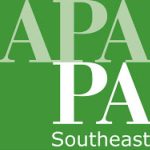WSP has opened applications for their 2026 Summer Internship program! Click through...
American Planning Association – Pennsylvania
Southeast Section
Creating Great Communities For All
Section News
Volunteers Needed – 2025-26 Future City...
The 2025-26 Future City Competition is underway and this is your opportunity...
Upcoming Events
No upcoming events at this time.
Homepage Photo Credit: Lane Fike / Schuylkill River Development Corporation (SRDC)
